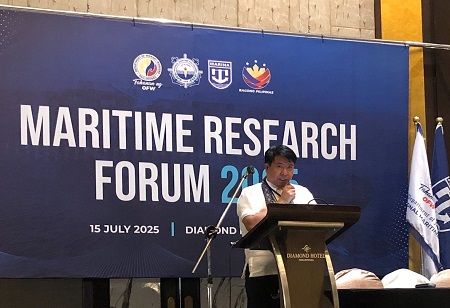- Philippine Maritime Workforce Portal (PMWP) launched by NMP to centralize data on Filipino seafarers and fishermen for smarter, evidence-based maritime governance.
- Backed by MARINA and other national agencies, the platform features real-time labor analytics to align workforce skills with global maritime trends.
- Forum spotlighted gender issues, education gaps, and future-readiness, as two maritime modernization bills move through Congress to boost shipbuilding and registry reforms.
In a first-of-its-kind move to revolutionize the maritime industry, the National Maritime Polytechnic (NMP) inaugurated the Philippine Maritime Workforce Portal (PMWP) at the NMP Maritime Research Forum in Manila. The online platform marks a significant move toward data-driven maritime governance through a single source of information of Filipino seafarers and fishermen.
Built as an active planning instrument instead of a fixed repository, the PMWP will carry extensive analytics such as demographic information, education and training history, employment trends, and labor market data. The aim is to support more evidence-informed policymaking and improve synchronization of the nation's maritime labor supply with global industry requirements.
It was bolstered by various agencies, including the Maritime Industry Authority (MARINA), the Commission on Higher Education, the Philippine Coast Guard, and the Presidential Office for Maritime Concerns. MARINA Deputy Administrator Nenita Atienza underscored the portal's capability to raise the life of seafarers and enhance the maritime capabilities of the country.
Presidential Office Secretary Andres Centino cited the platform's role in defining responsive policies and remedying longstanding issues within the maritime labor force. The initiative was institutionalized through a memorandum of agreement between participating agencies, which signifies the country's commitment to reform in the seas.
Also Read: RecruitFirst Extends Service Agreement with Singapore MOE via HRnetGroup
The forum also provided a space for sharing key research from maritime education institutions. Issues addressed were workforce development, gender issues in shipping, and the low level of education among Filipino fishermen. Experts claimed that improved education could empower fishermen to read maritime regulations and establish territorial claims in more contested seas. In the meantime, studies also pointed out the prevalent but poorly documented phenomenon of harassment of women on board ships, and advocating for more secure protection measures and gender-sensitive policy-making domains in which the portal data can be a critical factor.
Aside from workforce analytics, the nation also drives maritime modernization through two legislative bills pending in Congress: the Shipbuilding and Ship Repair Development Bill and the Philippine Ship Registry Bill. These intend to revitalize domestic shipyards and make shipping vessel registration easier. Meanwhile, MARINA is pushing for Filipino seafarers to be upskilled to address the global industry's transition to decarbonization, automation, and alternative fuels, emphasizing that investing in human capital is the key to the readiness of the industry in the future.

